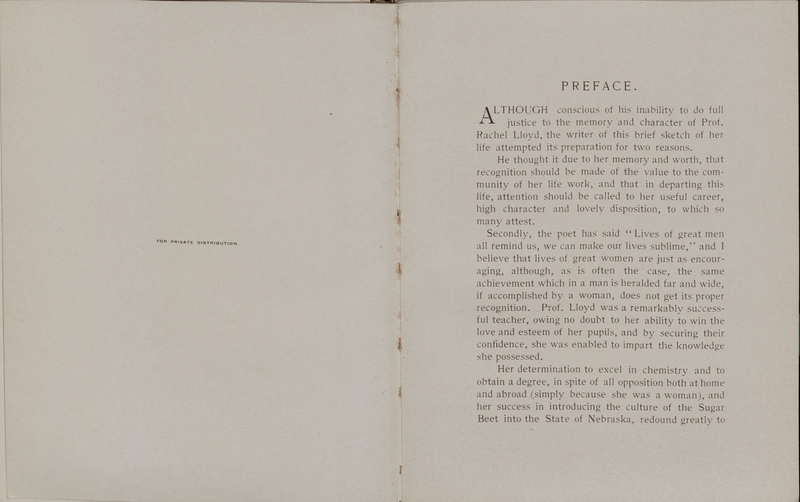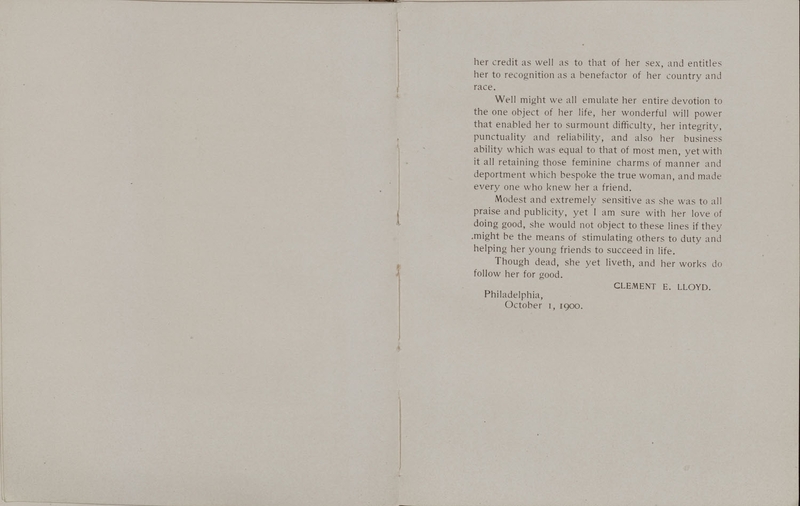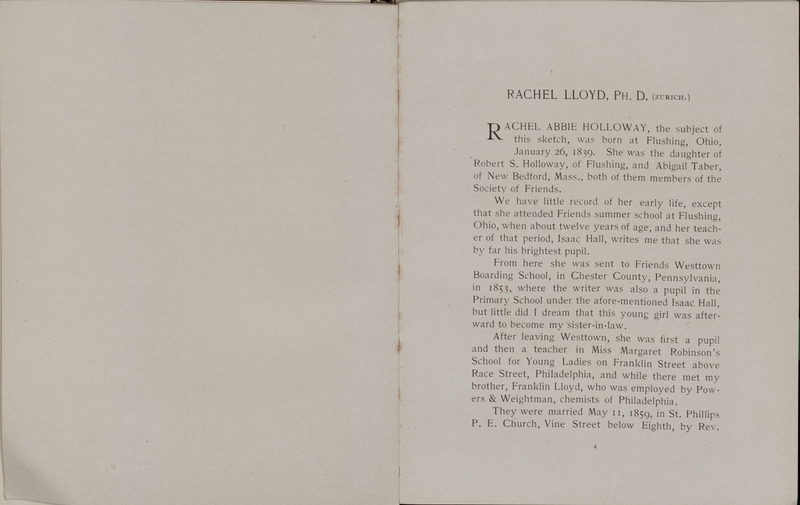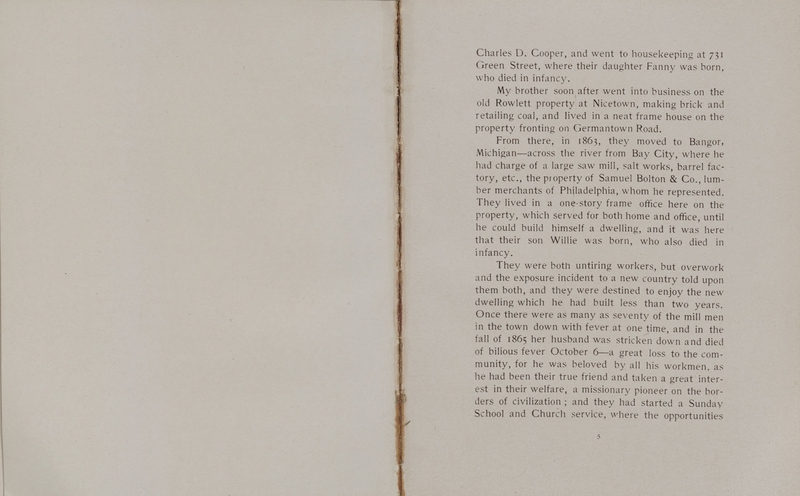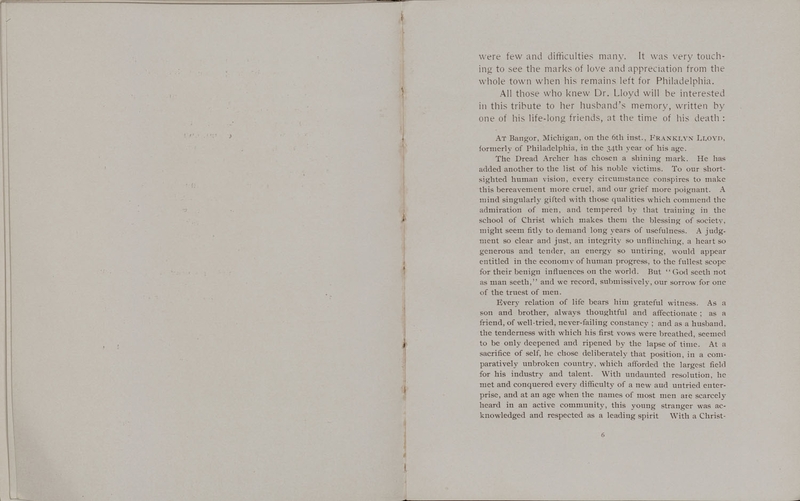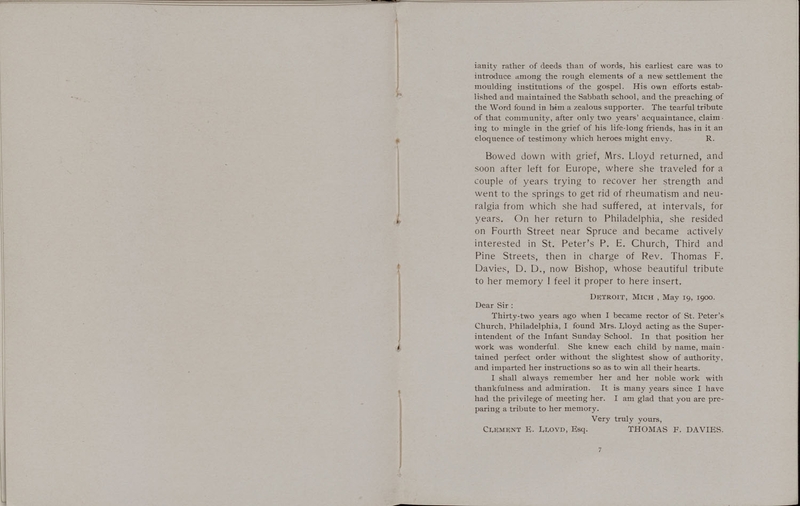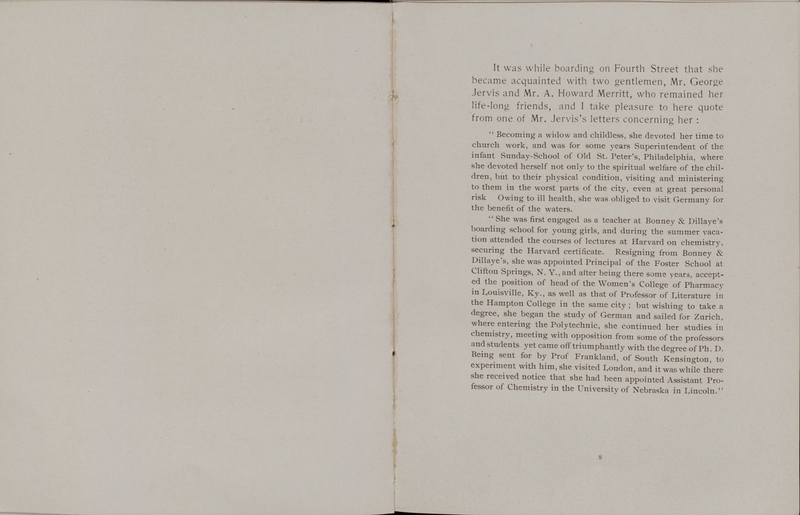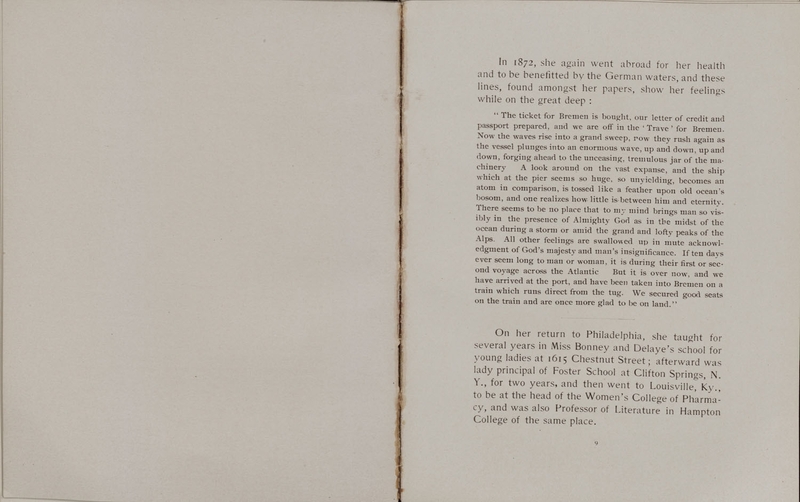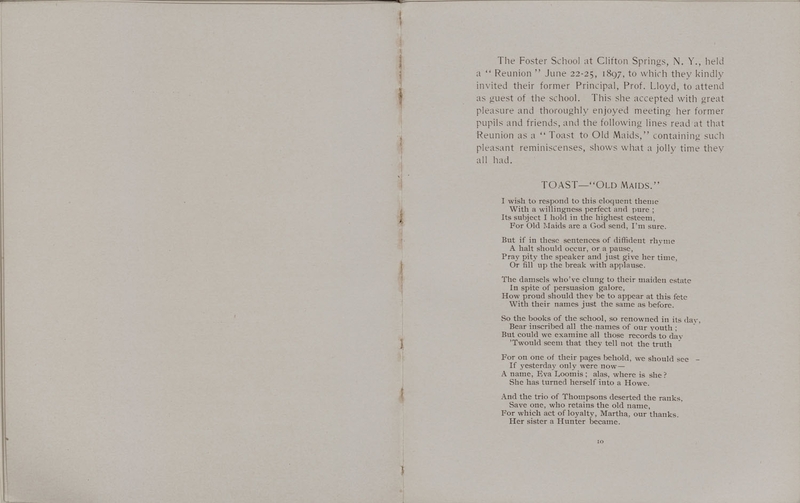PREFACE
Although conscious of his inability to do full justice to the memory and character of Prof. Rachel Lloyd, the writer of this brief sketch of her life attempted its preparation for two reasons.
He thought it due to her memory and worth, that recognition should be made of the value to the community of her life work, and that in departing this life, attention should be called to her useful career, high character and lovely disposition, to which so many attest.
Secondly, the poet has said "Lives of great men all remind us, we can make our lives sublime," and I believe that lives of great women are just as encouraging, although, as is often the case, the same achievement which in a man is heralded far and wide if accomplished by a woman, does not get its proper recognition. Prof. Lloyd was a remarkably successful teacher, owing no doubt to her ability to win the love and esteem of her pupils, and by securing their confidence, she was enabled to impart the knowledge she possessed.
Her determination to excel in chemistry and to obtain a degree, in spite of all opposition both at home and abroad (simply because she was a woman), and her success in introducing the culture of the Sugar Beet into the State of Nebraska, redound greatly to
her credit as well as to that of her sex, and entitles her to recognition as a benefactor of her country and race.
Well might we all emulate her entire devotion to the one object in her life, her wonderful will power that enabled her to surmount difficulty, her integrety, punctuality, and reliability, and also her business ability which was equal to that of most men, yet with it all retaining those feminine charms of manner and deportment which bespoke the true woman, and made everyone who knew her a friend.
Modest and extremely sensitive as she was to all praise and publicity, yet I am sure with her love of doing good, she would not object to these lines if they might be the means of stimulating others to duty and helping her young friends to succeed in life.
Though dead, she yet liveth, and her works do follow her for good.
CLEMENT E. LLOYD
RACHEL LLOYD. Ph. D. (ZURICH.)
RACHEL ABBIE HOLLOWAY, the subject of this sketch, was born at Flushing, Ohio, January 26, 1839. She was the daughter of Robert S. Holloway, of Flushing, and Abigail Taber, of New Bedford, Mass., both of them members of the Society of Friends.
We have little record of her early life, except that she attended Friends summer school at Flushing, Ohio, when about twelve years of age, and her teacher of that period, Isaac Hall, writes me that she was by far his brightest pupil.
From here she was sent to Friends Westtown Boarding School, in Chester County, Pennsylvania, in 1853, where the writer was also a pupil in the Primary School under the afore-mentioned Isaac Hall, but little did I dream that this young girl was afterward to become my sister-in-law.
After leaving Westtown, she was first a pupil and then a teacher in Miss Margaret Robinson's School for Young Ladies on Franklin Street above Race Street, Philadelphia, and while there met my brother, Franklin Lloyd, who was employed by Powers & Weightman, chemists of Philadelphia.
They were married May 11, 1859, in St. Phillips P. E. Church, Vine Street below Eighth, by Rev.
Charles D. Cooper, and went to housekeeping at 731 Green Street, where their daughter Fanny was born, who died in infancy.
My brother soon after went into business on the old Rowlett property at Nicetown, making brick and retailing coal, and lived in a neat frame house on the property fronting on Germantown Road.
From there, in 1863, they moved to Bangor, Michigan — across the river from Bay City, where he had charge of a large saw mill, salt works, barrel factory, etc., the property of Samuel Bolton & Co., lumber merchants of Philadelphia, whom he represented. They lived in a one-story frame office here on the property, which served for both home and office, until he could build himself a dwelling, and it was here that their son Willie was born, who also died in infancy.
They were both untiring workers, but overwork and the exposure incident to a new country told upon them both, and they were destined to enjoy the new dwelling which he had built less than two years. Once there were as many as seventy of the mill men in the town down with fever at one time, and in the fall of 1865 her husband was stricken down and died of bilious fever October 6 — a great loss to the community, for he was heloved by all his workmen, as he had been their true friend and taken a great interest in their welfare, a missionary pioneer on the borders of civilization; and they had started a Sunday School and Church service, where the opportunities
were few and difficulties many. It was very touching to see the marks of love and appreciation from the whole town when his remains left for Philadelphia.
All those who knew Dr. Lloyd will be interested in this tribute to her hushand's memory, written by one of his life-long friends, at the time of his death:
AT Bangor, Michigan, on the 6th inst., FRANKLYN LLOYD, formerly of Philadelphia, in the 34th year of his age.
The Dread Archer has chosen a shining mark. He has added another to the list of his noble victims. To our shortsighted human vision, every circumstance conspires to make this bereavement more cruel, and our grief more poignant. A mind singularly gifted with those qualities which commend the admiration of men, and tempered by that training in the school of Christ which makes them the blessing of society, might seem fitly to demand long years of usefulness. A judgment so clear and just, an integrity so unflinching, a heart so generous and tender, an energy so untiring, would appear entitled in the economy of human progress, to the fullest scope for their benign influences on the world. But "God seeth not as man seeth," and we record, submissively, our sorrow for one of the truest of men.
Every relation of life bears him grateful witness. As a son and brother, always thoughtful and affectionate; as a friend, of well-tried, never-failing constancy; and as a husband, the tenderness with which his first vows were breathed, seemed to be only deepened and ripened by the lapse of time. At a sacrifice of self, he chose deliberately that position, in a comparatively unbroken country, which afforded the largest field for his industry and talent. With undaunted resolution, he met and conquered every difficulty of a new aud untried enterprise, and at an age when the names of most men are scarcely heard in an active community, this young stranger was acknowledged and respected as a leading spirit. With a Christ
ianity, rather of deeds than of words, his earliest care was to introduce among the rough elements of a new settlement the moulding institutions of the gospel. His own efforts established and maintained the Sabbath school, and the preaching of the Word found in him a zealous supporter. The tearful tribute of that commmunity, after only two years' acquaintance, claiming to mingle in the grief of his life-long friends, has in it an eloquence of testimony which heroes might envy. R.
Bowed down with grief, Mrs. Lloyd returned, and soon after left for Europe, where she traveled for a couple of years trying to recover her strength and went to the springs to get rid of rheumatism and neuralgia from which she had suffered, at intervals, for years. On her return to Philadelphia, she resided on Fourth Street near Spruce and became actively interested in St. Peter's P. E. Church, Third and Pine Streets, then in charge of Rev. Thomas F. Davies, D. D., now Bishop, whose beautiful tribute to her memory I feel it proper to here insert.
DETROIT, MICH, May 19, 1900. Dear Sir:
Thirty-two years ago when I became rector of St. Peter's Church, Philadelphia, I found Mrs. Lloyd acting as the Superintendent of the Infant Sunday School. In that position her work was wonderful. She knew each child by name, maintained perfect order without the slightest show of authority, and imparted her instructions so as to win all their hearts.
I shall always remember her and her noble work with thankfulness and admiration. It is many years since I have had the privilege of meeting her. I am glad that you are preparing a tribute to her memory.
Very truly yours,
THOMAS F. DAVIES.
It was while boarding on Fourth Street that she became acquainted with two gentlemen, Mr. George Jervis and Mr. A. Howard Merritt, who remained her life-long friends, and I take pleasure to here quote from one of Mr. Jervis's letters concerning her:
"Becoming a widow and childless, she devoted her time to church work, and was for some years Superintendent of the infant Sunday-School of Old St. Peter's, Philadelphia, where she devoted herself not only to the spiritual welfare of the children, but to their physical condition, visiting and ministering to them in the worst parts of the city, even at great personal risk. Owing to ill health, she was obliged to visit Germany for the benefit of the waters.
"She was first engaged as a teacher at Bonney & Dillaye's boarding school for young girls, and during the summer vacation attended the courses of lectures at Harvard on chemistry, securing the Harvard certificate. Resigning from Bonney & Dillaye's, she was appointed Principal of the Foster School at Clifton Springs, N. Y., and after being there some years, accepted the position of head of the Women's College of Pharmacy in Louisville, Ky., as well as that of Prufessor of Literature in the Hampton College in the same city; but wishing to take a degree, she began the study of German and sailed for Zurich, where entering the Polytechnic, she continued her studies in chemistry, meeting with opposition from some of the professors and students yet came off triumphantly with the degree of Ph.D. Being sent for by Prof Frankland, of South Kensington, to experiment with him, she visited London, and it was while there she received notice that she had been appointed Assistant Professor of Chemistry in the University of Nebraska in Lincoln."
In 1872, she again went abroad for her health and to be benefitted by the German waters, and these lines, found amongst her papers, show her feelings while on the great deep:
"The ticket for Bremen is bought, our letter of credit and passport prepared, and we are off "in the 'Trave' for Bremen. Now the waves rise into a grand sweep, row they rush again as the vessel plunges into an enormous wave, up and down, up and down, forging ahead to the unceasing, tremulous jar of the machinery[.] A look around on the vast expanse, and the ship which at the pier seems so huge, so unyielding, becomes an atom in comparison, is tossed like a feather upon old ocean's bosom, and one realizes how little is between him and eternity. There seems to be no place that to my mind brings man so visibly in the presence of Almighty God as in the midst of the ocean during a storm or amid the grand and lofty peaks of the Alps. All other feelings are swallowed up in mute acknowledgment of God's majesty and man's insignificance. If ten days ever seem long to man or woman, it is during their first or second voyage across the Atlantic[.] But it is over now, and we have arrived at the port, and have been taken into Bremen on a train which runs direct from the tug. We secured good seats on the train and are once more glad to be on land."
On her return to Philadelphia, she taught for several years in Miss Bonney and Dellaye's school for young ladies at 1615 Chestnut Street; afterward was lady principal of Foster School at Clifton Springs, N. Y., for two years, and then went to Louisville, Ky., to be at the head of the Women's College of Pharmacy, and was also Professor of Literature in Hampton College of the same place.
The Foster School at Clifton Springs, N. Y., held a " Reunion" June 22-25, 1897, to which they kindly invited their former Principal, Prof. Lloyd, to attend as guest of the school. This she accepted with great pleasure and thoroughly enjoyed meeting her former pupils and friends, and the following lines read at that Reunion as a "Toast to Old Maids," containing such pleasant reminiscenses, shows what a jolly time they all had.
TOAST — "OLD MAIDS."
I wish to respond to this eloquent theme With a willingness perfect and pure; Its subject I hold in the highest esteem, For Old Maids are a God send, I'm sure.
But if in these sentences of diffident rhyme A halt should occur, or a pause, Pray pity the speaker and just give her time, Or fill up the break with applause.
The damsels who've clung to their maiden estate In spite of persuasion galore, How proud should they be to appear at this fete With their names just the same as before.
So the books of the school, so renowned in its day, Bear inscribed all the names of our youth; But could we examine all those records to day 'Twould seem that they tell not the truth
For on one of their pages behold, we should see — If yesterday only were now — A name, Eva Loomis; alas, where is she? She has turned herself into a Howe.
And the trio of Thompsons deserted the ranks. Save one, who retains the old name, For which act of loyalty, Martha, our thanks. Her sister a Hunter became.

